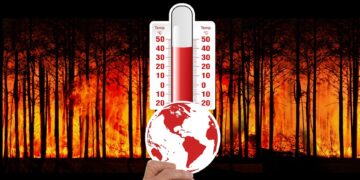The Human Toll of Global Warming: How Climate Change is Impacting Our Health and Well-being
Global warming, also known as climate change, is one of the most pressing issues facing our planet today. The rise in global temperatures caused by greenhouse gas emissions is having a profound impact on our environment, economy, and health. In this article, we will explore the human toll of global warming and how it is affecting our health and well-being.
Health Impacts of Climate Change
Climate change is leading to an increase in extreme weather events such as heatwaves, hurricanes, and floods. These events can have a direct impact on our physical health, causing injuries, illnesses, and even death. For example, heatwaves can lead to heat exhaustion, heatstroke, and dehydration, while hurricanes and floods can result in injuries from falling debris, drowning, and waterborne diseases.
In addition to these acute health impacts, climate change is also contributing to the spread of infectious diseases. Rising temperatures and changing weather patterns are creating more favorable conditions for the spread of diseases such as malaria, dengue fever, and Zika virus. Warmer temperatures can also lead to an increase in allergens such as pollen, which can exacerbate respiratory conditions like asthma.
Well-being Impacts of Climate Change
Climate change is not only affecting our physical health but also our mental and emotional well-being. The stress and anxiety caused by natural disasters, food insecurity, and displacement can have a significant impact on our mental health. Studies have shown that people who have experienced extreme weather events are more likely to suffer from anxiety, depression, and post-traumatic stress disorder.
Climate change is also exacerbating social inequalities, with marginalized communities bearing the brunt of its impacts. Low-income communities and communities of color are more likely to live in areas that are vulnerable to extreme weather events and environmental pollution. These communities often have limited access to healthcare, clean water, and nutritious food, making them more susceptible to the health impacts of climate change.
Adaptation and Mitigation Strategies
While the health and well-being impacts of climate change are concerning, there are steps that can be taken to mitigate these impacts and adapt to a changing climate. One key strategy is to reduce greenhouse gas emissions through the use of renewable energy sources, energy efficiency measures, and sustainable transportation options. By reducing our carbon footprint, we can slow the rate of global warming and lessen its impacts on our health and well-being.
Another important strategy is to strengthen our public health infrastructure to better prepare for and respond to the health impacts of climate change. This includes investing in early warning systems for extreme weather events, improving access to healthcare in vulnerable communities, and promoting public health education and awareness about the health risks of climate change.
Conclusion
Climate change is not just an environmental issue – it is a public health crisis that is affecting our health and well-being in profound ways. From extreme weather events to the spread of infectious diseases, the impacts of global warming are wide-reaching and far-reaching. By taking action to reduce greenhouse gas emissions and strengthen our public health infrastructure, we can help protect ourselves and future generations from the health impacts of climate change.
It is imperative that we work together as a global community to address the root causes of climate change and take steps to mitigate its impacts. By doing so, we can create a healthier, more resilient world for ourselves and for future generations.












